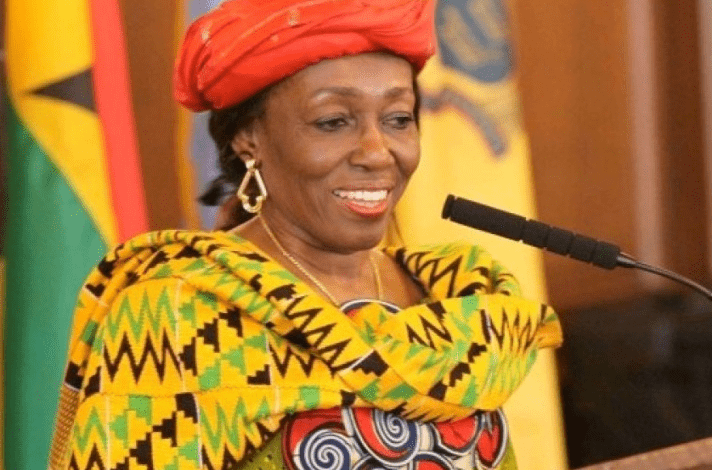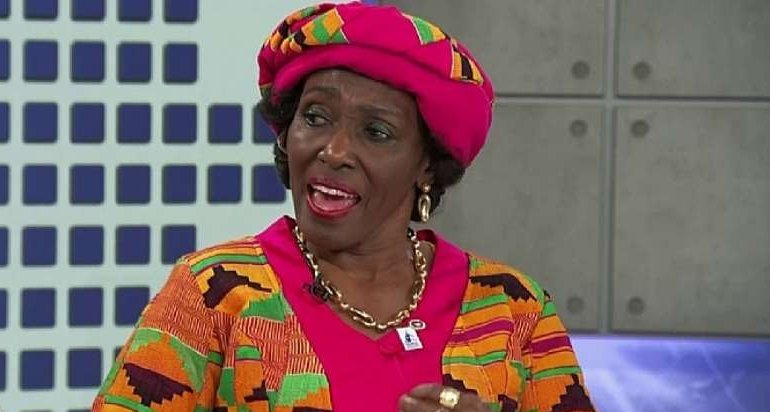
Remembering Nana Konadu Agyeman-Rawlings: A Trailblazer for Ghanaian Women
Nana Konadu Agyeman-Rawlings, one of Ghana’s most influential political figures, passed away at 76 at Ridge Hospital in Accra. Known as Ghana’s ‘Iron Lady’, she broke barriers by becoming the first woman to run for president in the country. Her pioneering spirit reshaped women’s leadership in Ghana.
She was not just former president Jerry Rawlings’s wife but a powerful force in her own right as the founder and leader of the National Democratic Party (NDP). Her 22-year tenure as Ghana’s First Lady from 1979 to 2001 marked her as one of Africa’s most dynamic First Ladies. Her vision for women’s advancement led her to create the 31st December Women’s Movement (DWM) in 1984, an NGO that championed women’s education, economic independence, and empowerment.
The movement’s impact was extraordinary. It brought together more than two million women across Ghana and built over 870 pre-schools nationwide[-3][-4]. Nana Konadu’s advocacy led to Ghana’s Intestate Succession Law, giving widows and female children inheritance rights. Her leadership also helped Ghana become the world’s first country to ratify the United Nations Convention on the Rights of the Child in 1991. Her life’s work stands as a testament to her unwavering commitment to uplift Ghanaian women and revolutionize her nation’s social fabric.
Early Life and Education of Nana Konadu
Image Source: MyJoyOnline
Nana Konadu Agyeman entered the world on November 17, 1948, in Ghana’s coastal city of Cape Coast, Central Region. Her birth coincided with a pivotal time, just a decade before Ghana would achieve independence.
Childhood in Cape Coast and family background
J.O.T. Agyeman and his wife welcomed Nana Konadu into their middle-class family that boasted prestigious connections. She traced her lineage directly to the Ashanti Royal family and counted the Asantehene (king) as her cousin. Her father’s career as a manager at the University Admissions Center in Cape Coast led the family to move several times. The third among seven siblings—six girls and one boy—Nana Konadu grew up in an environment that championed education and independent thinking.
Schooling at Achimota and KNUST
Her mother, a teacher by profession, started Nana Konadu’s education at home. She later joined Ghana International School before moving to the prominent Achimota School in Accra. Achimota proved significant as she met her future husband, Flight Lieutenant Jerry John Rawlings there. Her athletic prowess shone through as she excelled in sprinting events including 100 meters, 200 meters, relays, and participated in high jump and long jump competitions.
After completing secondary school, she chose to study Art and Textiles at the Kwame Nkrumah University of Science and Technology (then known as the University of Science and Technology). Her leadership qualities emerged during university years as she served as a student leader at her residence hall, Africa Hall.
Advanced studies in Ghana and abroad
The London College of Arts awarded her a diploma in Interior Design in 1975. Her thirst for knowledge drove her to pursue more education over the next decades. She earned a diploma in Advanced Personnel Management from Ghana’s Management Development and Productivity Institute in 1979. Her academic journey continued as she got a certificate in Development from the Ghana Institute of Management and Public Administration (GIMPA) in 1991.
Her educational pursuits crossed international borders with specialized courses at Johns Hopkins University and the Institute for Policy Studies in Baltimore, USA. A certificate from a Fellows Program in Philanthropy and Non-Profit Organizations added to her expertise, which later shaped her advocacy work.
The Rise of a Social Advocate

Nana Konadu Agyeman-Rawlings transformed from First Lady to social champion in 1982 with the creation of the 31st December Women’s Movement (DWM), a non-governmental organization that changed women’s roles in Ghana.
Founding the 31st December Women’s Movement
Ghana faced revolutionary changes on May 15, 1982. Nana Konadu and other passionate women created the DWM to ensure women participated in the nation’s development. She had a clear vision: “My desire is to see the emancipation of women at every level of development to enable them to contribute and benefit from the socio-economic and political progress of the country”. Her leadership helped the grassroots organization grow rapidly, which mobilized about two million women across the nation.
Empowering women through education and entrepreneurship
Nana Konadu saw “the complete absence of academic opportunity for the girl-child” in rural Ghana. The DWM responded by launching adult literacy programs and financial training to help women run businesses and manage household finances. She believed in economic independence: “We recognized that for women to be really empowered for development we needed to make them economically active”.
The movement taught women valuable skills in:
- Dressmaking, hairdressing, and soap-making
- Cassava processing to produce local staples
- Previously male-dominated industries such as beekeeping and pottery
Building preschools and community programs
Nana Konadu’s impact grew as she built more than 870 daycare centers and preschools throughout Ghana. These facilities supported working mothers and promoted early childhood education. Her initiatives expanded beyond childcare to include child immunization programs, family planning education, and nutrition campaigns.
She championed legal reform and played a vital role in adopting the Intestate Succession Law. This legislation gave inheritance rights to widows who had few or no rights after their husband’s death.
Political Journey and Breaking Barriers

Nana Konadu’s political influence reached way beyond her supportive role at her husband’s side. She became Ghana’s longest-serving First Lady from 1979 to 2001. Her first term began after Jerry Rawlings’ brief stint as military Head of State in 1979, and her second term lasted from December 1981 through January 2001.
Role as First Lady and beyond
Nana Konadu used her platform to support women’s rights after her husband’s military coup in 1981. The National Democratic Congress (NDC) elected her as First Vice Chairperson in 2009. Her political skills and ambition became clear as she sought more influence in Ghana’s political world.
Challenging the NDC leadership in 2011
Nana Konadu made a bold and unprecedented move by challenging sitting President John Evans Atta Mills for the NDC’s flagbearership position in 2011. She became the first person to contest an incumbent president’s automatic right to nomination. Her bid failed despite her husband’s strong backing and support from her two-million-strong women’s movement.
Founding the National Democratic Party
She broke away from the NDC—the party she co-founded with her husband—in October 2012 and established the National Democratic Party (NDP) as her political vehicle.
Becoming Ghana’s first female presidential candidate
Her political career reached new heights in 2016 when she made history as Ghana’s first female presidential candidate. People nicknamed her “The Hillary Clinton of Africa,” but she secured just 0.16% of votes cast. She showed her steadfast dedication by submitting nomination forms to lead the NDP again in the 2020 general elections.
Legacy and National Impact
Image Source: The Voice of Africa
Nana Konadu Agyeman-Rawlings’ legislative influence reaches way beyond her political career. She stands as a pioneer for women’s rights in Ghana.
Legal reforms and rights advocacy
Nana Konadu played a key role in passing the Intestate Succession Law (PNDCL 111) in 1985. This law protected widows’ inheritance rights in a society where women had little claim to property after their husbands’ deaths. Ghana became the first nation to approve the United Nations Convention on the Rights of the Child in 1991 under her guidance. She successfully pushed to outlaw female genital mutilation and shaped gender equality provisions in Ghana’s 1992 constitution.
Recognition at home and abroad
Her work in governance and gender support earned her prestigious honors. Johns Hopkins University’s Institute of Policy Studies named her a Senior Fellow in 1994. The Boardroom Institute of the Graduate School of Governance and Leadership awarded her an Honorary Emeritus Fellowship. She shared her experiences and steadfast dedication to enabling women in her 2018 memoir, It Takes a Woman.
Mentorship and influence on young women
“A lot of women are now on committees in their villages and districts, some are chairing the committees,” Nana Konadu once remarked, showing her success in breaking barriers. Her support helped elect 19 women to parliament in 1992. She believed that “women’s empowerment in agriculture has a direct effect on food security, job creation, and national development”.
Tributes from political and civil society leaders
Ghana’s parliament adjourned in her honor after her death. The country’s Ministry of Energy spokesperson called her “an exceptional First Lady whose visionary leadership and strong organizational skills left an indelible mark on Ghana’s history”. Takoradi MP Kwabena Okyere Darko-Mensah praised her work on the Intestate Succession Law, describing it as “a model law that has supported a lot of women”.
Nana Konadu Agyeman-Rawlings stands as a giant in Ghana’s political and social world. Her trip from First Lady to presidential candidate showed her steadfast dedication to strengthening women and social justice. The 31st December Women’s Movement she created changed millions of lives. Her advocacy brought new laws that protected women and children in Ghana.
She broke down barriers for Ghanaian women in politics. Her presidential campaign didn’t succeed, but her bold challenge to traditional norms created opportunities for future female leaders. Today, more than 870 preschools she built serve communities across the nation. This creates a legacy that reaches way beyond her political achievements.
Ghana lost more than a former First Lady when Nana Konadu died. The country lost a visionary who knew that real national growth needed women’s complete participation. Her life shows how determination and principled leadership can create real change. Future generations of Ghanaian women will look up to her example as they continue her work to build a fairer society where people value women’s voices and contributions.
Nana Konadu Agyeman-Rawlings’ legacy teaches us that big changes often start with one person ready to challenge the existing system. Her story proves how much difference someone can make with clear vision and unwavering purpose.






